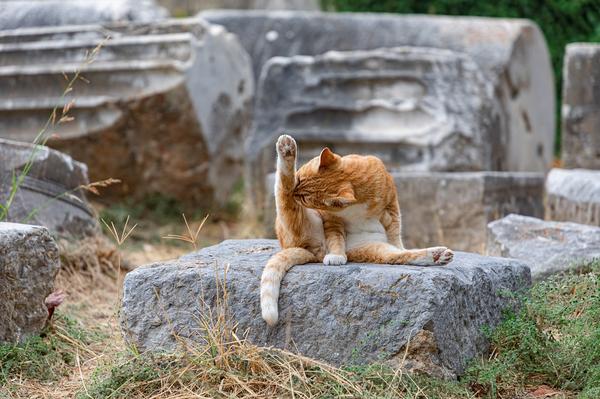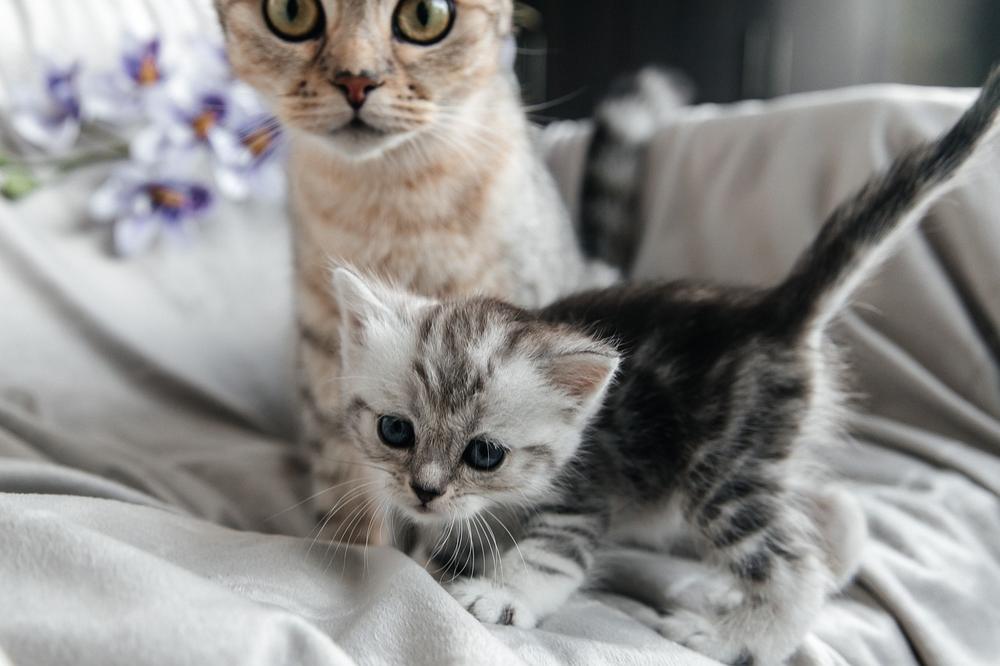Why Is My Cat NOT Eating After Giving Birth? Time to WORRY?

Ever had that sinking feeling in your gut when your furry friend just won't touch her food?
Worried sick about your postpartum cat's health?
We've all been there, trust me.
So, buckle up, fellow fur parents, because we're about to uncover the reasons why Fluffy isn't nibbling away. 😿
Let's dive right in, shall we?
Reasons Why a Cat May Not Eat After Giving Birth
- When a cat has given birth, her hormones can mess with her appetite.
- If there were some complications during delivery, she might temporarily lose her appetite.
- Feeling more anxious or down can make it harder for her to eat.
- Believe it or not, eating the placenta takes precedence over regular food for her.
- Emotional stress can be a real buzzkill for her appetite.
- The physical toll of giving birth can affect how hungry she feels.
- If she's having trouble digesting stuff, that can obviously impact her ability to chow down.
- It's pretty common for mama cats to prioritize taking care of their precious kittens before satisfying their own hunger.
- After giving birth, it's totally normal for her to have less interest in food.
- Make sure you're keeping an eye on her overall health and encouraging her to get back into her usual eating routine.
But what exactly can you do to ensure your cat receives proper nutrition after giving birth?

Well, we've got a solution that will not only benefit her health but also support her postnatal recovery.
Curious to know more?
What to Do If Your Cat Isn't Eating After Giving Birth
Is your cat not eating after giving birth?
That's a bit worrying, but don't stress!
Here are some practical tips to help you out:
- Keep an eye on how much she eats and how often. This'll give you a better idea of the problem's severity.
- Try offering smaller meals throughout the day instead of a full bowl of food. It might encourage her to eat.
- Make sure she gets all the right nutrients by giving her high-quality cat food made for nursing moms.
- Hydration is key, so always have fresh water available for her.
- If she keeps refusing food or seems distressed, it's best to consult your vet. They can give you advice tailored to her needs.
Taking care of your cat's health is super important right now. 😺
And if your cat continues to not eat after trying these tips, you must consider the various medical conditions and complications that may be affecting her appetite...
Potential Health Issues That Can Cause a Cat to Stop Eating After Giving Birth
Mastitis and other post-birth complications
Giving birth can sometimes lead to health issues for cats.
One common problem is mastitis, which is an infection of the mammary glands that can cause pain, swelling, and discomfort. This may make it hard for your cat to eat.
Other conditions like Metritis or Endometritis can also occur. They cause inflammation in the uterus and have symptoms such as fever, indifference to kittens, refusal to eat, lack of activity, vomiting, and foul-smelling discharge.
Diagnosing and treating these conditions
To diagnose these conditions, your vet will perform various examinations such as blood tests, physical examination, radiograph, ultrasound imaging, and analysis of vaginal discharge.
Once diagnosed, treatment options may include antibiotics, surgery if necessary, providing fluids through hospitalization, and balancing electrolyte levels.
Another reason why your cat might lose appetite after giving birth is Feline Infectious Peritonitis (FIV), a viral disease that affects the immune system.
Other factors affecting appetite
Apart from medical conditions, there are other possible reasons for a lack of appetite in cats after giving birth.
These may include side effects from vaccinations, inadequate nutrition affecting nursing ability, sickness, weight loss, low energy levels, and hormonal fluctuations leading to unusual behavior.
It's not unusual for cats to exhibit certain behaviors after giving birth, such as eating placentas.
While this is normal, it can sometimes result in vomiting, depression, decreased appetite, and even neglecting the needs of the kittens.
Keep an eye out for any abnormal signs or behaviors, and don't hesitate to consult your veterinarian if you have any concerns.
In case you're worried about your cat's appetite after giving birth, don't fret.
I understand that this can be a cause for concern.
If you want to learn more about how long a cat can live without eating and the potential reasons for their loss of appetite, I recommend reading my blog post on How Long Does It Take for a Cat to Die if It Stops Eating.
You'll find valuable information and insights that might bring you some comfort.
Tips to Encourage a Cat to Eat After Giving Birth
Here are some tips to help you get your cat to eat after giving birth:
- Warm up the food: This will make it smell better and more appealing to your cat.
- Add enticing extras: Things like fish oil, broth, or cooked egg can make the food tastier and more attractive for your cat.
- Don't offer stale food: Cats won't eat old or spoiled food, so always provide fresh meals.
- Transition gradually from human food to cat food: Mix a little bit of cat food into the human food at first, then increase the amount of cat food over time.
- Stay away from cow's milk: 🐱 It's not good for cats and can cause tummy problems.
- Create a calm feeding area: Make sure the space is quiet and comfortable so your cat feels safe and relaxed while eating.
These strategies should help your cat eat well after giving birth and keep her and her kittens healthy.
Remember, a happy cat is a healthy cat!
How to Support a Cat's Nutritional Needs After Giving Birth
A nursing mother cat needs a well-balanced diet with all the essential nutrients to thrive.
Her energy needs are higher during pregnancy and lactation, so it's good to feed her highly digestible diets. Moreover, nursing cats may require extra nutrition like milk to support their own health and provide for their kittens.
When it comes to feeding the young ones, veterinarians might suggest using a specific milk replacer.
And don't forget about the importance of fresh, clean water... Always make sure to provide it to the mother cats.
When to Seek Veterinary Help for a Cat Not Eating After Giving Birth
If your cat just had kittens and she's not eating, that's a sign you might need to take her to the vet. Here are some things to look out for:
- If your cat seems dehydrated, like her gums are dry and she's acting tired, you should definitely get her to the vet right away.
- It could be a serious problem if your cat won't eat after giving birth, so it's really important to talk to a vet and get their advice.
- If your cat hasn't eaten anything in more than a day or doesn't show any interest in food even 12 hours after giving birth, you should reach out to a veterinarian.
- Cats vomiting or showing signs of being sick, including the kittens, should also get checked out by a vet.
- The vet might recommend doing tests, giving IV fluids, prescribing antibiotics, managing pain, or even doing surgery.
- Don't wait too long - if your cat goes without eating for two or three days after giving birth, you should seek immediate veterinary attention.
- It's normal for cats to eat the placentas of their kittens, but if your cat still isn't eating after one day, it's important to have a vet figure out what's going on.
Your cat's health is really important, so don't hesitate to call a vet if you're worried about her.
Common Mistakes to Avoid When Trying to Get a Cat to Eat After Giving Birth
When trying to get a cat to eat after giving birth, there are some common mistakes you should avoid.
Here's what you need to know:
- Don't forcefeed the cat: This can lead to increased stress and a reluctance to eat.
- Avoid leaving first-time mothers or anxious queens alone with their kittens until it's confirmed they won't harm their offspring.
- Consider using Feliway diffusers or spray to help calm the cats in stressful situations.
- Don't offer unfamiliar or new foods immediately after giving birth: Stick with familiar and easily digestible options.
- Avoid overcrowding the feeding area: Provide enough space for each cat to eat comfortably.
- Don't ignore any signs of illness or discomfort: If your cat continues to refuse food or shows other concerning symptoms, consult your veterinarian.
Maintaining a calm and stress-free environment is essential for helping a cat regain her appetite after giving birth.
By avoiding these common mistakes, you can better support your cat's nutritional needs during this crucial period.
Ensuring a Healthy Appetite for Postpartum Cats
Key Takeaways:
- Increased anxiety and depression can cause a cat not to eat after giving birth.
- Consumption of the placenta is common, resulting in a temporary loss of appetite.
- Birthing difficulties and physical injuries can contribute to a cat's decreased appetite.
- Ignoring a cat not eating after giving birth can negatively impact the mother's health.
- Medical conditions like Metritis or Endometritis may cause uterine inflammation and loss of appetite.
- Diagnosis of post-birthing conditions requires veterinary examinations and tests.
- Various treatment options, including antibiotics and surgery, may be necessary.
- Loss of appetite can also be caused by Feline Infectious Peritonitis (FIV) or inadequate nutrition.
- Encouraging a cat to eat can be accomplished by heating food or adding enticing extras.
- Special diets and additional nutrition may be required for pregnant and nursing cats.
- Seek immediate veterinary care if a cat refuses to eat or shows signs of sickness.
- Do not leave first-time mothers alone with their kittens until their behavior is assessed and use calming aids if needed.
And that wraps up today's article.
If you wish to read more of my useful articles, I recommend you check out some of these: How Long Can a Cat Go Without Water, When to Put Your Cat Down the Complete Checklist, How to Deal With Regret and Grief After Putting Cat to Sleep, How Long Can a Cat Survive Locked in a Shed, and What Happens if Your Cat Eats or Licks Toothpaste
Talk soon,
-Sarah Davis